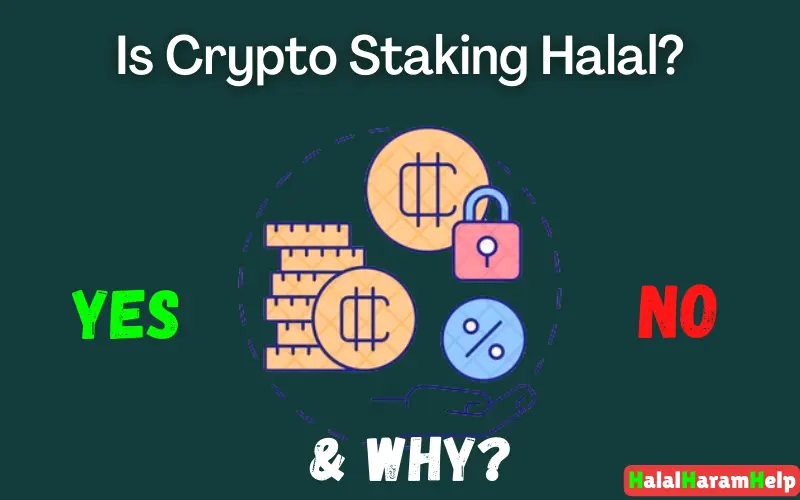As cryptocurrency continues to evolve, the practice of crypto staking emerges as a means for investors to earn passive income and participate in blockchain networks.
However, for adherents of Islamic finance, the question is crypto staking halal remains unresolved.
In this exploration, we delve into the complexities of this debate, examining the mechanics of crypto staking alongside Islamic jurisprudence. Let’s get started.

Is Crypto Staking Halal?
From an Islamic perspective, whether crypto staking is allowed depends on following certain important principles. Some scholars argue that it aligns with Islamic finance principles, others raise concerns regarding elements of uncertainty and speculation.
Crypto staking involves locking up cryptocurrency to support blockchain networks and earn rewards.
Ultimately, the halal status of crypto staking depends on factors such as the nature of the cryptocurrency, the staking process, and the resulting rewards.
Muslims interested in staking should ask knowledgeable scholars for advice and carefully consider the ethical aspects.
If you ask our opinion, the halal status of crypto staking depends on several factors shared above. However, considering Islamic teachings we would recommend avoiding crypto staking until there is a clear answer.
If you’re using a credit card you must also learn is credit card halal.
Why Staking Crypto Can Be Haram?
Here are some major reasons why most crypto staking is considered haram:
Riba (Interest):
One of the primary concerns is the potential resemblance to riba or interest. If staking rewards are considered guaranteed or fixed returns, they might be seen as riba, which is prohibited in Islam.
Gharar (Uncertainty):
Crypto staking can involve elements of gharar, or excessive uncertainty. The value of the rewards and the staked tokens can be highly volatile, leading to significant financial risk and uncertainty.
Speculation and Gambling:
Engaging in crypto staking might be akin to speculation or maysir, both of which are forbidden in Islam. If staking is done with a high level of speculation, it could be considered haram.
Sharia Compliance:
The underlying blockchain technology and the specific cryptocurrency being staked must be Sharia-compliant. Some cryptocurrencies might involve projects or elements that are not permissible under Islamic law.
Halal Alternate Options To Crypto Staking
As we have seen crypto staking is not completely halal so here are some of the best halal investment options idea for you:
Islamic Savings Accounts:
Islamic banks offer savings accounts that comply with Sharia principles. These accounts avoid interest and instead operate on profit-sharing models, providing returns based on legitimate business activities.
Sukuk (Islamic Bonds):
Sukuk are Sharia-compliant bonds that provide returns through profit-sharing or rental income rather than interest. Investing in sukuk allows Muslims to earn returns while adhering to Islamic financial principles.
Halal Investment Funds:
There are mutual funds and exchange-traded funds (ETFs) that invest in Sharia-compliant assets. These funds avoid businesses involved in prohibited activities and provide a diversified investment option.
Real Estate:
Investing in real estate is considered halal if done according to Islamic principles. Income generated from renting properties is permissible, and real estate can be a stable and tangible asset.
Equity Investments in Halal Companies:
Investing in stocks of companies that comply with Sharia law is another option. Screening for halal companies involves avoiding businesses related to haram drinks, and interest-based financing.
You can also learn is APR Haram?.
FAQs
Q. Is staking crypto halal in Islam?
A: The permissibility of staking crypto in Islam is debated among scholars. It depends on factors such as the nature of the cryptocurrency, the staking process, and the terms of rewards. However, there is no clear halal status, so better to avoid it.
Q. Is staking halal on binance?
A: Staking on Binance or any other platform is not inherently halal or haram. The halal status depends on the specific cryptocurrency being staked and the terms and conditions set by the platform.
Q. Is it halal to do crypto trading?
A: Crypto trading is a complex issue in Islamic finance. Trading cryptocurrencies can be considered halal if it avoids prohibited activities such as riba (interest), gharar (excessive uncertainty), and maysir.
Conclusion
Determining whether crypto staking is halal involves understanding both the technical aspects of staking and the principles of Islamic finance.
While some argue that it aligns with Sharia law, concerns about interest, uncertainty, and speculation remain.
Therefore, each individual should carefully assess the specific staking process and consult knowledgeable scholars for guidance.
If you find this complex, we would recommend avoiding it to be on the safe side.


